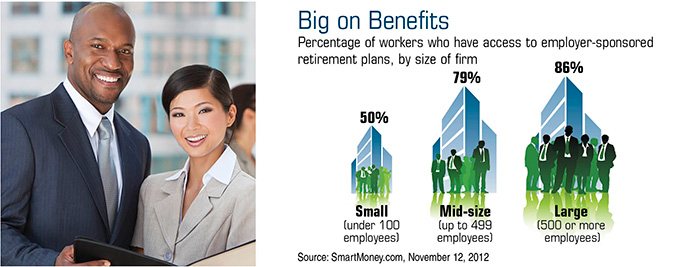Within certain guidelines, employers are generally allowed to auto-enroll workers in employer-sponsored retirement plans and divert a set percentage of compensation into workers’ accounts unless they specifically opt out or change the contribution rate. Automatic enrollment tends to boost participation; in fact, average participation for company plans with auto enrollment exceeds 85%, compared with 67% for plans without it.1
Thus, auto enrollment could make it more likely that a plan will pass the IRS nondiscrimination testing ordinarily required for traditional 401(k) plans. Auto enrollment can be added to any new or existing plan that allows elective salary deferrals, including 401(k)s and SIMPLE IRAs utilized by small businesses.
Comparing the benefits and limitations of various retirement plans may help you determine whether one of them might meet your company’s needs.

Safe Harbor 401(k) Plan
“Safe harbor” plans designed for smaller firms are typically more flexible than traditional 401(k)s offered by many large companies. Owners may be able to make larger contributions for themselves (as employee and employer) in exchange for making tax-deductible contributions or “matches” for employees.
The maximum employee contribution in 2013 and 2014 is $17,500 ($23,000 for those 50 and older). Employers must either match employee contributions — 100% of the first 3% of deferred salary plus 50% of the next 2% of deferred salary — or make a non-elective contribution of 3% of salary for each eligible employee. Match, profit share, and/or total contributions cannot exceed 100% of an employee’s compensation or $52,000 in 2014.
SIMPLE IRA
Companies with 100 or fewer employees may use a SIMPLE IRA salary-reduction plan, which requires little or no paperwork, if they do not currently have another retirement plan in place. The maximum employee contribution in 2013 and 2014 is $12,000 ($14,500 for those aged 50 and older). The required match is 100% of the first 3% of participant contributions or 2% of all eligible employee salaries.
Employer-sponsored retirement plan distributions are taxed as ordinary income. Withdrawals prior to age 59½ may be subject to a 10% federal income tax penalty. Early withdrawals (prior to age 59½) from a SIMPLE IRA during the first two years of participation may be subject to a 25% penalty (10% thereafter).
1) MarketWatch, March 15, 2013

